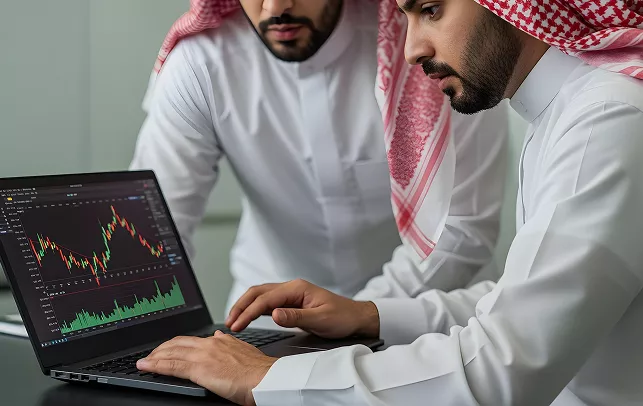Always up-to-date
Our experts continuously werify broker data to provide the most up-to-date information
Lest updated on
May 23, 2025
We double-check broker fee details each month which is made possible through parthner paid advertising. Learn more this here.
Best Islamic Forex Brokers: Trade Halal in 2025
In 2025, the demand for Islamic Forex brokers continues to shape how platforms build their infrastructure. Islamic forex accounts, which exclude interest (riba) and speculative elements (gharar), are now offered by dozens of regulated providers — but not all of them meet the standards of genuine Sharia compliance.


A true Islamic forex broker eliminates overnight interest and avoids artificial markups or hidden fees. Transparent pricing, real asset-backed execution, and compliance with Islamic financial ethics define the structure of such accounts. Regulation, speed, and platform stability remain important — but layered within a halal-compliant framework.
The global growth of Islamic forex trading has driven competition among brokers — especially in the Gulf, Southeast Asia, and Africa. Leading firms now offer dedicated Islamic account forex options with alternative fee models and trading terms built around halal investing principles.





What is an Islamic Forex Account?
An Islamic Forex account is a type of trading account that adheres to the core principles of Sharia law. It prohibits the payment or receipt of interest (riba), which makes traditional Forex trading — where positions held overnight often incur swap fees — non-compliant for Muslim traders.
To align with Islamic finance ethics, Islamic forex accounts are structured without overnight swaps. Brokers remove interest-bearing components from trade rollover mechanisms, ensuring that all operations stay within halal boundaries. This model is also known as a forex Islamic account or Islamic trading account, depending on the platform.
Instead of charging or paying interest, brokers may apply fixed administrative fees or modify spreads — but these adjustments must be transparent and not resemble hidden interest. A legitimate Islamic forex trading account reflects real asset-backed transactions, without speculative overexposure or excessive uncertainty (gharar).
Islamic forex brokers offering these accounts typically restrict access to instruments or practices that contradict Islamic norms — such as trading on margin with high leverage, or using synthetic derivatives. However, within permitted conditions, traders still gain access to major currency pairs, commodities, and indices.
How Do Islamic Forex Accounts Work?
Islamic forex accounts are built to avoid interest-based earnings while maintaining full trading functionality. In standard Forex accounts, positions held overnight are subject to swap fees — either debited or credited, depending on interest rate differentials. This is incompatible with Sharia law, which strictly prohibits riba.
To comply, Islamic forex brokers remove these interest charges altogether. Trades held overnight on an Islamic forex trading account do not accumulate swaps, regardless of duration or direction. Instead, brokers may apply a transparent flat fee or widen the spread slightly to cover operational costs — without linking those adjustments to time or interest rates.
Technically, the trading process remains unchanged: traders can open and close positions, use charting tools, and execute orders on platforms like MT4 or MT5. What changes is the underlying cost structure, which must remain neutral and free from interest-like components.
Some Islamic fx brokers introduce holding period limits or asset-specific restrictions to maintain compliance. For example, high-volatility instruments or certain synthetic derivatives may be excluded. These limitations are not universal but are typically listed in the broker’s terms for halal accounts.
In essence, the logic of an Islamic forex account is to enable market participation without crossing into prohibited financial mechanisms — preserving both technical capability and ethical consistency.
Differences Between Standard and Islamic Forex Accounts
While both account types give access to the same markets and platforms, their structure and compliance approach differ significantly. Here are the key distinctions:
- Swap charges;
- Fee structure;
- Leverage and instruments;
- Transparency;
- Religious compliance;
Key Features of an Islamic Forex Trading Account
A genuine Islamic forex trading account must meet both functional and ethical criteria. These are the core features that distinguish it from conventional accounts:
- No swap or rollover interest
The defining trait of any Islamic forex account — all trades are free from interest-based overnight charges.
- Fixed or transparent alternative fees
Instead of swaps, some Islamic forex brokers apply a clearly stated administrative fee that is not tied to interest rate differentials.
- Access to halal-compliant instruments
Certain assets may be restricted to prevent exposure to speculative or non-Sharia-compliant products.
- Full trading functionality
Platforms such as MT4, MT5, and cTrader are fully supported. Execution speed and market access remain on par with standard accounts.
- Defined holding rules
Some Islamic fx brokers set limits on how long positions can remain open to prevent disguised interest accumulation.
- Sharia compliance statement
Reputable brokers often provide documentation or third-party certification confirming that the Islamic forex account structure aligns with Islamic financial principles.
Who Can Open an Islamic Forex Account?
Contrary to common belief, Islamic forex accounts are not reserved exclusively for Muslim traders. While their structure is designed to comply with Sharia law, many Islamic forex brokers offer these accounts to any client who requests them — regardless of religious affiliation. The key requirement is adherence to the account’s conditions, which include the prohibition of interest and potential limits on certain trading behaviors.
To open a forex Islamic account, traders typically need to request it through the broker’s client portal or support team. Some brokers automatically approve the request, while others may require a declaration or justification for swap-free status. In regulated environments, especially in Europe or the Middle East, brokers may be required to apply stricter verification to avoid misuse of Islamic forex trading accounts for purely financial advantage.
Best Islamic Forex Brokers
Best Islamic Forex Brokers: Our Top Picks
Choosing the right broker is critical for anyone using an Islamic forex account. In 2025, the number of platforms offering swap-free trading has grown, but only a limited group of providers combine technical performance with real Sharia compliance.
The best Islamic forex brokers offer more than just the removal of interest. They provide verified account structures, transparent fee policies, and operational clarity. Many of them are regulated in multiple jurisdictions and work with independent advisors or Islamic scholars to ensure compliance with financial ethics outlined in Sharia law.
What separates a reliable Islamic forex broker from others is not only the absence of swaps but also how they structure alternative fees. Whether it’s a small markup, a fixed charge per lot, or no added fee at all, these policies must be clearly disclosed and decoupled from time-based financing models.

Regions such as the GCC, Southeast Asia, and parts of Africa have seen an uptick in demand for Islamic forex trading services — pushing major brokers to create fully dedicated account types. For global traders, especially those who follow Islamic principles, this offers a practical way to trade while staying within the bounds of halal finance.
Top 5 Islamic Forex Brokers in 2025:
- Exness Islamic Account – trusted globally, transparent swap-free model
- XM – flexible account types with verified Sharia compliance
- IC Markets – low spreads and fast execution on Islamic forex accounts
- AvaTrade – strong regional presence in the Middle East
- Pepperstone – excellent infrastructure and halal trading conditions
How to Choose the Best Islamic Forex Broker?
Selecting the best Islamic forex broker involves more than comparing spreads or checking for a swap-free label. To ensure true Sharia compliance and long-term reliability, several core factors must be considered.
First is regulation. A trustworthy Islamic forex broker must be licensed by a respected authority — such as the FCA, ASIC, or DFSA. Proper oversight ensures that the broker maintains operational transparency, client fund segregation, and fair execution practices. Without regulation, any claim of being a halal forex broker loses credibility.
Next is fee structure. The absence of swaps doesn’t mean the absence of cost. Some brokers replace interest with administrative fees or markup the spread slightly. The key is transparency: charges must be fixed, disclosed in advance, and not calculated in a way that mimics interest — a requirement for any legitimate Islamic forex trading account.
Execution quality also matters. A reliable Islamic fx broker should offer fast trade processing, low latency, and stable platforms.
Finally, review the terms. Some Islamic forex accounts come with limitations — such as restricted instruments, capped leverage, or holding period rules. These conditions vary across brokers and should be aligned with your strategy before opening an account.
Regulation and Compliance with Sharia Law
A proper Islamic forex broker must meet two parallel requirements: regulatory licensing and Sharia compliance. Regulation ensures financial transparency and client protection, while Sharia adherence guarantees that the Islamic forex account structure avoids riba, gharar, and unethical practices.
Many Islamic forex brokers are monitored by authorities like the FCA, CySEC, or DFSA. At the same time, some work with Islamic finance scholars or boards to certify their Islamic forex trading accounts. This dual-layer oversight separates real halal offerings from generic swap-free options.
Trading Platforms for Islamic Forex Traders
A reliable Islamic forex broker must offer platforms that support fast execution, clear fee visibility, and stable performance. Most Islamic forex accounts are available on MetaTrader 4, MetaTrader 5, and cTrader — the industry standards for retail trading.
These platforms allow full trading functionality while integrating swap-free logic on the broker’s side. Whether placing market orders, running EAs, or managing exposure, traders using an Islamic forex trading account get access to the same tools — just without interest-bearing mechanics.
Commission-Free vs. Fee-Based Islamic Accounts
Not all Islamic forex accounts operate under the same pricing model. Some brokers offer commission-free accounts with slightly wider spreads, while others use a fixed administrative fee per trade. Both formats aim to eliminate riba, but the structure matters.
A transparent Islamic forex trading account should clearly state how costs are applied. If fees are disguised as interest or fluctuate with holding time, the account may fail to meet halal standards. Trusted Islamic forex brokers disclose all charges up front — whether through a spread markup or a per-lot fee — so traders can assess costs without compromising compliance.
Best Islamic Forex Brokers in Kuwait
The Kuwaiti market is one of the most active in the Gulf region when it comes to Islamic forex trading. Local traders often seek platforms that align with both global standards and Sharia compliance. While some domestic brokers operate under the oversight of the Capital Markets Authority (CMA), many Kuwaiti traders prefer to work with large international Islamic forex brokers regulated in multiple jurisdictions.
Key factors like Arabic-language support, Islamic account availability, and compatibility with local funding methods (such as KNET or bank transfers) influence broker choice in the region. Most platforms offer Islamic forex accounts through swap-free setups, and leading brokers ensure these accounts are available without compromising execution speed or transparency.
Best Islamic Forex Brokers in Kuwait:
- IC Markets – swap-free accounts with raw spreads and global access
- Exness – Arabic support, instant funding, and flexible account types
- AvaTrade – strong Gulf presence and verified Sharia-compliant models
- XM – localized promotions, Islamic account option by request
- FBS – swap-free trading with regional account managers
Islamic Forex Trading Strategies: What Works Best?
Effective trading on an Islamic forex account begins with understanding which strategies are compatible with both market logic and Sharia law. Since riba (interest) is prohibited, any approach that relies on earning or avoiding swap fees is irrelevant in this context. Instead, the focus shifts toward structure, timing, and ethical engagement with the market.
Unlike conventional accounts, Islamic forex trading accounts are free from overnight interest — which opens up unique opportunities in short- and medium-term strategies. However, traders must also consider risk exposure and the nature of their transactions to avoid gharar (excessive uncertainty). In this framework, several approaches have proven especially effective for halal trading.

Swing Trading on an Islamic Account
Swing trading is particularly suited to Islamic forex accounts, as it often involves holding positions for several days — without being penalized by swap charges. Traders can target broader market moves, using technical and fundamental signals to identify medium-term price cycles. Since no interest is charged for holding positions overnight, the entire profit/loss outcome depends solely on price movement — keeping the structure compliant with Islamic finance ethics.
Day Trading in Islamic Forex
Day trading also aligns well with Islamic forex trading, as it avoids any overnight exposure by default. Positions are opened and closed within the same day, eliminating concerns about swaps or long-term speculation. The fast-paced nature of day trading means traders must rely on tight spreads, low latency, and precise execution — all of which are available from most leading Islamic forex brokers.
Long-Term Investing for Halal Trading
Longer-term strategies can also be used with a forex Islamic account, but require more careful planning. While swaps are not charged, some brokers impose administrative fees for extended holding periods. Traders who invest based on macroeconomic themes, central bank policy shifts, or multi-week patterns must verify that such fees don’t reintroduce interest-like costs. Instruments like currency pairs, gold, and indices can be used for halal investing, provided they reflect real underlying value and are not overly leveraged.
Risk Management in Islamic Forex Trading
Regardless of the strategy, risk management is essential for anyone using an Islamic forex account. Sharia law prohibits speculative behavior — which includes taking on excessive, unjustified risk. Proper position sizing, clearly defined stop-loss levels, and adherence to a consistent plan help keep the trading process within halal limits. Islamic forex brokers may also enforce risk parameters by limiting leverage or restricting certain instruments, which further supports ethical trading practices.
Common Misconceptions About Islamic Forex Trading
Despite the growing popularity of Islamic forex trading, there are still many misconceptions about how these accounts work, who can use them, and whether they are truly halal. Understanding the mechanics and boundaries of an Islamic forex account helps dispel myths and avoid confusion — especially for traders who are new to swap-free systems or ethical finance in general.
Are Islamic Forex Accounts Really Swap-Free?
Yes, Islamic forex accounts are designed to exclude overnight interest charges. However, the absence of swaps doesn’t mean the broker incurs no cost. To compensate, many Islamic forex brokers introduce alternative fees — typically fixed administrative charges or slightly wider spreads. These adjustments are meant to recover operational expenses without violating the prohibition on riba. As long as such fees are not linked to duration or interest rates, they remain compliant with Sharia law.

Is Islamic Forex Trading Completely Risk-Free?
No trading system is ever risk-free — and Islamic forex trading is no exception. Although these accounts eliminate interest and speculative elements, traders still face standard market risks: price volatility, slippage, execution errors, and emotional decision-making. In fact, the absence of swap penalties can sometimes lead traders to hold losing positions longer than advisable. Proper risk management remains essential, regardless of account type or compliance status.
Do Islamic Accounts Have Hidden Fees?
Not all Islamic forex accounts are created equal. While many Islamic forex brokers operate with transparency, others may apply fees that resemble disguised swaps — especially for long-term trades. These can take the form of unclear “holding charges,” variable commissions, or embedded spreads that fluctuate with time.
Can Non-Muslims Use Islamic Forex Accounts?
Yes. Most Islamic forex brokers allow non-Muslim clients to open swap-free accounts. The core purpose of the forex Islamic account is to provide a Sharia-compliant structure — not to limit access based on religion. Brokers may ask for a formal request or justification, but in most cases, the account is available to anyone who agrees to follow its rules.
FAQ: Islamic Forex Brokers and Trading
What is the Best Islamic Forex Broker?

How Do Islamic Forex Accounts Avoid Interest?

Are Islamic Forex Accounts Really Halal?

Do Islamic Forex Accounts Have Additional Fees?

Can I Use Leverage on an Islamic Forex Account?

Is There a Minimum Deposit for Islamic Forex Accounts?

Are There Any Restrictions on Islamic Forex Trading?

What is the Best Trading Platform for Islamic Forex Trading?

How to Withdraw Profits from an Islamic Forex Account?

Can I Convert a Standard Forex Account to an Islamic Account?




